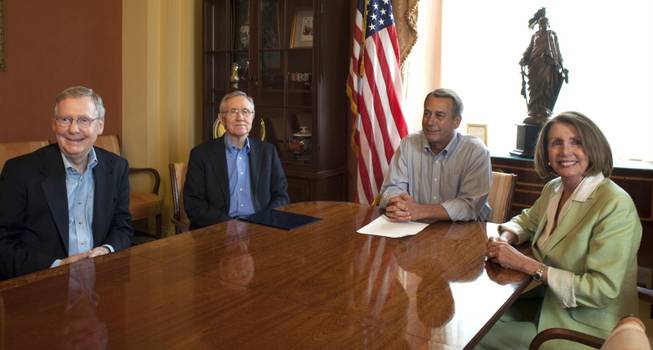
Harry Hamburg / AP
Senate Minority Leader Mitch McConnell, R-Ky., Senate Majority Leader Harry Reid, D-Nev., House Speaker John Boehner, R-Ohio, and House Democratic Leader Nancy Pelosi, D-Calif., are seen at a photo opportunity in the House speaker’s office before a meeting on the debt limit increase on Capitol Hill in Washington on Saturday, July 23, 2011.
Friday, July 29, 2011 | 1:54 p.m.
The power center of these debt negotiations has ricocheted around Washington, D.C., like pinball in an arcade, making quick and erratic stops in the Oval Office, the House speaker’s chambers, the majority leader’s Senate suite, and back again.
But at the eleventh hour, there’s no question that the power — of compromise, of content and of a solution — has come to rest in the hand of one man: Sen. Mitch McConnell, the Republican leader.
As the House and Senate have moved further and further apart, talks between the two party principals in Congress, Senate Majority Leader Harry Reid and House Speaker John Boehner, have all but been reduced to messages communicated across the Capitol via cable TV stations.
That’s leaving McConnell as the man everyone still wants to talk to.
“The ball is in his court, and only his court,” Sen. Charles Schumer said Friday.
McConnell’s position in this standoff is a natural one of go-between. With Boehner, with whom he speaks several times a day, according to a spokesman, McConnell shares the principles and common goals of the GOP to which they both belong. But he also has a close relationship with Reid, which manifested itself this month when the two came together to craft a backup, fail-safe plan to raise the debt limit and avoid default. According to senior Democratic aides, that plan is still drafted and in concept, kicking, even if things between Reid and McConnell have temporarily iced over.
“I’ve invited Senator McConnell to sit down and negotiate with me in good faith. I hope he’ll accept my offer,” Reid said Friday, offering the opposite as well, in a sign of how important McConnell is. “I’ll go to him. We need him to come to the table.”
But for now, McConnell is holding a hard pro-Republican line.
“Over in the House of Representatives you’ve got the speaker of the house doing his job,” McConnell said on the Senate floor Friday morning. “Over here in the Senate? The contrast couldn’t be starker.
“The Democratic majority in the Senate has been wasting precious time rounding up no votes to keep this crisis alive,” he said, laying into the majority leader even as Reid was re-entering the chamber and stopped to listen to McConnell’s screed. “They’ve been busy signing people up for the not-good-enough caucus and ginning up opposition to everything else ... Democrats are out bragging about how they’re going to prolong the crisis instead of doing something to solve it!”
In ordinary circumstances, Reid might have fought back. But the words he offered McConnell after he concluded his remarks are evidence of just how careful Democrats are being with man they hope, this weekend, becomes their most important ally.
“I really appreciate my friend’s statement,” Reid said calmly, not a hint of sarcasm apparent. “I will work as closely as I can on any suggestions he has — but please, everybody, please, don’t come to me with a six-month extension.”
To get a compromise, Democrats and Republicans need to agree on a “trigger” mechanism — one that will let them bridge the divide between a short-term and a long-term solution to preserve the country’s borrowing authority.
The House has proposed at least two — a vote on the product of a Joint Commission of lawmakers, a vote on a constitutional balanced budget amendment, and Senate lawmakers have suggested that a vote on the Gang of Six’s framework might be a third.
But the problem with all of those is that they require Congress to swallow some deep, deep cuts in mandatory federal spending within just a few months, and if Congress can’t agree on a way forward, there’s no authority to raise the debt limit, and the country will default.
Unless one element is part of the package — the fail-safe trigger that McConnell himself designed.
Under that plan, McConnell gave President Barack Obama the authority to submit a budget of cuts to Congress, which lawmakers could either vote to accept — thereby permitting the debt limit to be raised — or reject, with a motion of disapproval. The president could then veto that motion, and if Congress couldn’t overcome the veto, he’d have the unfettered right to raise the debt limit.
The plan, which McConnell has taken pains to distance himself from as the level of debate has ratcheted up the last few days, would preserve the country’s borrowing authority, no matter what, through March of 2013.
It’s not universally popular with Republicans or Democrats. But it’s acceptable to enough members of both parties as a fail-safe mechanism — or in this case, potentially, a backup trigger — that it could likely clear Congress. Boehner has not outright objected to it either.
But that, or any compromise, rests on McConnell’s willingness to resume his relationship of two weeks ago with Reid.
According to a senior Democratic aide, politically, Reid’s camp isn’t expecting that to happen until the House finishes its business, and potentially not for several hours later. It depends on how much political latitude McConnell feels he needs before the “last hour” is truly upon them.
But they are expecting the two to come together again.


Join the Discussion:
Check this out for a full explanation of our conversion to the LiveFyre commenting system and instructions on how to sign up for an account.
Full comments policy